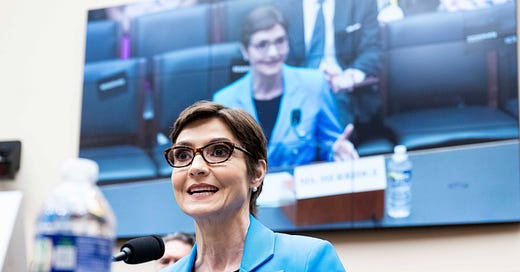
One of the things that makes America exceptional is that journalists here have freedoms that exist nowhere else. One of them is the freedom to publish information the government wants to keep secret. That also requires the freedom to rely on confidential sources to get that information.
As has been true at other times—the Pentagon Papers in 1971, the government’s secret investigation of Fox News reporter James Rosen in 2013—that freedom is now in jeopardy. The journalist Catherine Herridge is being punished for refusing to hand her sources over to the subject of a series of stories she aired back in 2017. The case could ruin her financially and might even lead to time in prison. What’s more, the courts are not allowing journalists to hear the entire case. Why? Because it involves supposedly secret government documents—exactly the kind of documents journalists work to expose.
The backstory: As an investigative reporter with Fox News, Herridge reported that the Department of Justice was probing a Chinese scientist and educator named Yanping Chen. The Fox pieces detailed Chen’s ties to the People’s Liberation Army and how her U.S. government–funded school marketed to American military personnel. U.S. regulators and lawmakers were concerned that data from the school could be shared with Beijing, according to Herridge’s reporting.
A year later, with no charges filed against her, Chen sued the FBI and other government agencies under the federal Privacy Act, alleging that they leaked confidential information to Herridge and Fox that was damaging to her reputation and businesses.
When Chen’s lawyers were unable to uncover her sources through depositions with government officials, they went after Herridge. In February, U.S. District Court judge Christopher Cooper held her in contempt of court—and fined her $800 a day—until she turned over her confidential sources. Although he said he “recognizes the paramount importance of a free press in our society and the critical role that confidential sources play in the work of investigative journalists like Herridge,” he added that he was required to strike a balance between press freedom and that Yanping Chen’s “need for the requested evidence overcomes Herridge’s qualified First Amendment privilege in this case.”
Press freedom advocates, however, fear that Cooper’s ruling against Herridge could cripple the ability of journalists to protect whistleblowers and confidential sources to provide critical information to the public. As Herridge wrote in The Free Press last June, “I know for a fact that if I hadn’t been able to offer my sources a credible pledge of confidentiality, they never would have divulged information that was being kept from the public.”
On Monday, Herridge’s lawyer, Patrick Philbin, argued that the court needed to understand the “societal cost” of compelling journalists to divulge their sources.
Ironically, in a case about press freedom, journalists were barred from attending the final portion of Monday’s hearing, because, said the judges, sensitive U.S. government information would be divulged. “The future of the reporters’ privilege for Washington, D.C.–based whistleblowers and journalists, a pretty important group, ends up being heard in secret,” Seth Stern, director of advocacy at the Freedom of the Press Foundation, told The Free Press.
In an email, Philbin told The Free Press, “This case presents vitally important issues concerning First Amendment protections for the press. We appreciated the opportunity to present our arguments to the Court, and we will await a decision.”
Herridge and press freedom advocates are lobbying Congress to push forward with legislation, called the PRESS Act, that would protect journalist-source confidentiality on the federal level. Currently, such press shield laws exist only on the state level.
“What’s really problematic is the absence of a federal reporters’ privilege law that would create standardized rules across federal circuits,” Stern said. “When a source is contemplating coming to a reporter, they want to know if they’re going to be protected. They want to know that they’re going to be protected in all jurisdictions.”
Jay Solomon is an investigative reporter for The Free Press. Follow him on X @FPJaySolomon. For more on Herridge’s case, read her piece, “Protecting Sources Is a Hill Worth Dying On.”
To support independent journalism, subscribe to The Free Press:



